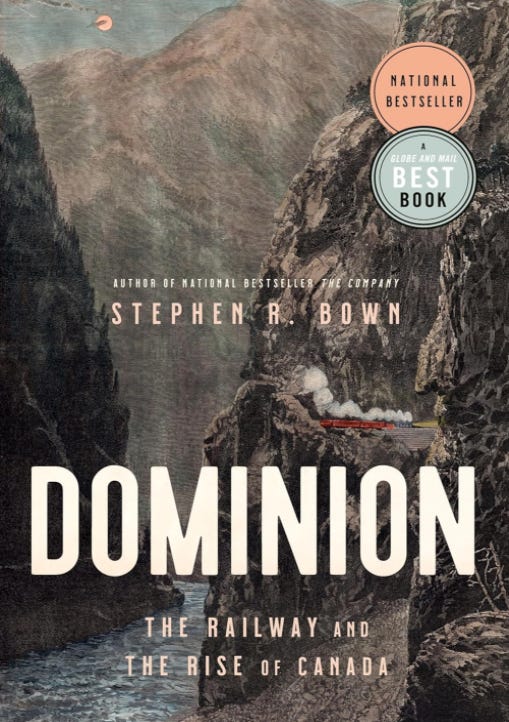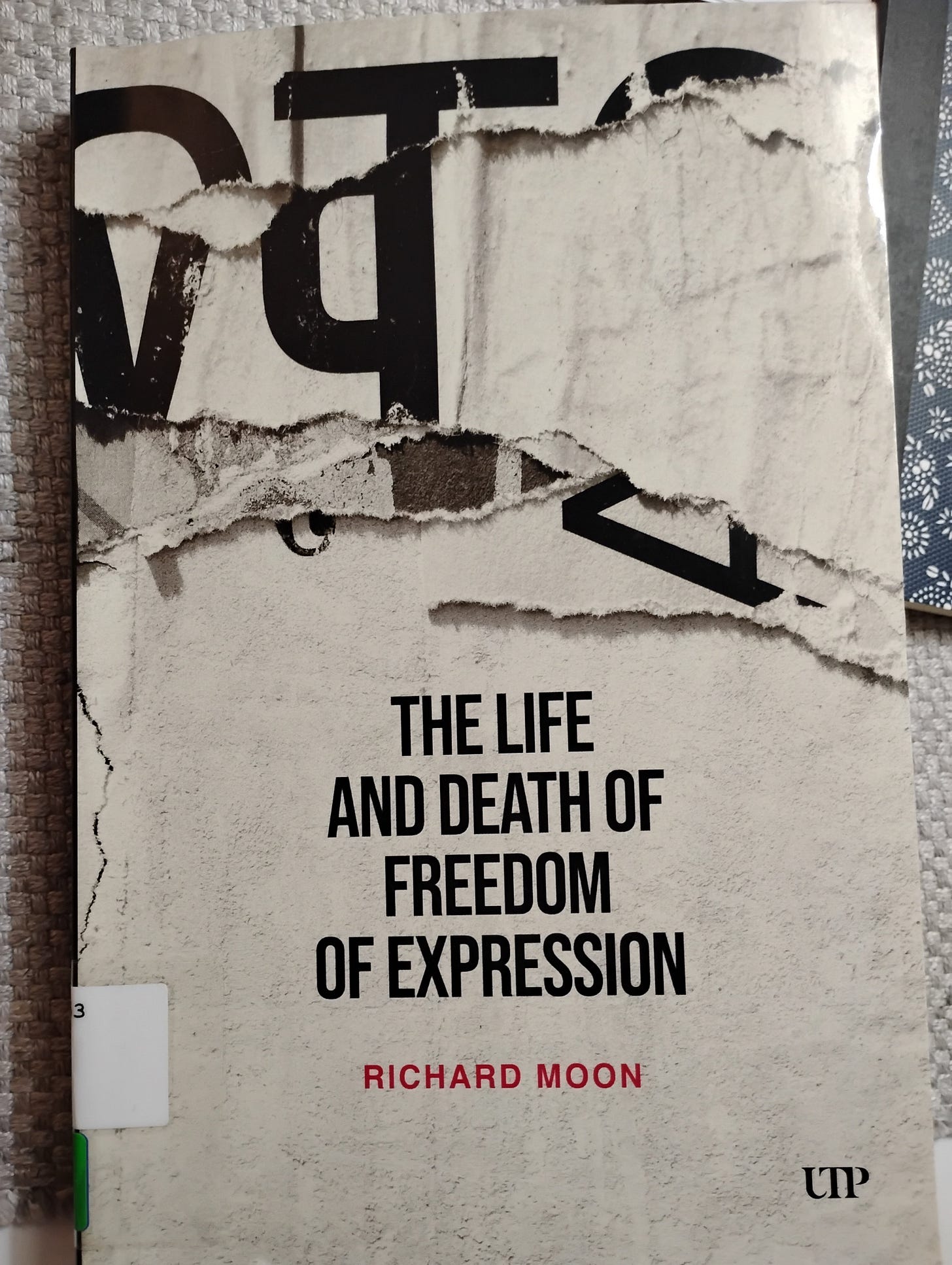I was worried, embarking on my next read for The Hub, Stephen Bown’s Dominion: The Railway and the Rise of Canada, that this book of Canadian history was going to be like all the other books of Canadian history from the last ten years, self-hating, inward-looking and dreadfully sorry that the country exists. It wasn’t like that - except perhaps in certain sections in a couple of chapters. The country’s first PM in this book was not a monster, the laying of the rail tracks was not a genocidal endeavour, the signing of the treaties was not a catastrophe, the creation of the Northwest Mounted Police (RCMP) was not the evil of colonization embodied. I did notice a certain wistfulness about the pre-rail Canada, a rosy view of the time when the fur traders lived with their indigenous wives in remote Hudson’s Bay Company outposts, and commented on this in the piece. You can read it here.
There is a lot in the book that I didn’t have space to talk about. The entire first section looks at the reasons that the area now known as British Columbia ended up deciding to join this new project called Canada. Rail was at the heart of it. Victoria and the environs were, Bown writes, the extension of the North California economy, situated on a busy gold rush highway. There were judges who, when invited to sort out the lawlessness, just borrowed American statutes and enforced those. The overground East-to-West-Coast migration of people was not a path easily undertaken: the phenomenon had its own name, The Crossing, and carried as many pitfalls as the crossing of the Atlantic. Bown follows one of the first groups of proto-Canadians to embark on the path in hope of a better life. The surveymen hired for the Pacific Rail company followed in their footsteps. Loss of property of course was expected along the way, but also loss of life. Fewer people made it than departed.
Americans had a cross-country rail system in place by that time, but it too had faced exactly the same problems of financing, engineering through hostile terrains, working conditions and local opposition. The day I filed the Dominion piece, I immediately turned to Joan Didion’s Where I Was From, which I vaguely knew was about California, the rail and ‘how the West was won’.
Turns out it’s a brilliant read, and about so many things at once: American history, class, California novel, the mysterious ways of memory, and Didion’s own parents and grandparents. California too had its own share of doubters about the rail and hooking itself up to the US capitalism and nationalism on the rise. Are we losing our way of life in order to become rich? What are we becoming rich for? “Amid all our rejoicing and all our gratulation let us see clearly whither we are tending. Increase in population and in wealth past a certain point means simply an approximation to the condition of older countries the Eastern States and Europe. Would the average Californian prefer to "take his chances" in New York or Massachusetts, or in California as it is and has been?”, wrote Henry George in the classical tract ‘What the railroad will bring us’, frequently quoted in the book.
Where I Was From is a de-mythologizing, sobering work, gently hacking away at the flattering stories we tell ourselves - well, Californians tell themselves, in this case. There’s a long history of Californians self-defining as entrepreneurial and fiercely individualist, but as Didion shows, the region has always been dependent on the federal government subsidizing or guarantor-ing this or that latest mad endeavour by the capital, railway included. Its waterways had to be tamed, canals built, flooding harnessed. Government departments and government-subsidized industries have always been major employers in California, defence and space in particular, but also corrections (there’s a particularly bleak chapter about prisons - which I expect are fewer now on the ground in the era of decriminalization of non-violent crimes).
Didion is sharp and compassionate on the Crossing, reading multiple accounts and comparing them to the persistent myth of it being a heroic achievement, the march of manifest destiny. The written records by the people who crossed and survived to tell the story are heart-breaking to one, the urgency to cross the Sierra Nevada mountain range before winter snows you in a recurring motif. The dead will be left behind, hastily buried; “never take no cutoffs and hurry along as fast as you can”, one letter instructs.
California, not in small part thanks to the rail traffic, jumped over the individual farming phase straight to the agribusiness, its history a history of welcoming one kind of speculator / VC after another. But Didion also questions the division between the old and the new California. When the “new people” era begins for its inhabitants? After World War Two? After the Depression? After the rail? Her parents, whose ancestors crossed in the early nineteenth century, somehow knew without defining it. But what is old changes too, as much as what is new.
There is a layered chapter on how a subdivision community built for the workers of two nearby defence factories and their families did not create a multi-generational middle class, only a couple of decades of prosperity for the original generation. Over that story, another layer - of the aimless, underemployed teens of the younger generation, and over all of it the story of the LA riots.
The Californian lineage, Didion muses in the last, most personal chapter, stops with her daughter Quintana, who is adopted and not growing up in California. All of it pales before her, she is thinking to herself while on a walk with her mother. Her memories, her mother’s; only Quintana is real. Her Sierra crossing will be somewhere else entirely.
Have any of you listened to the new CBC book program, Bookends? With Mattea Roach? The one that replaced Writers & Co.? I came across the episode in which she is interviewing Alan Hollinghurst about his new book and I think I’m still in pain. I am seriously worried about the CBC. I had no idea the situation was this bad. "You’ve always been drawn to the outsider queer protagonist but this is the first time that you've written from the perspective of someone who's also marginalized based on race. There've been discussions about race in your prior work but not from the POV of the person who's being racialized," is just part of the question that MR asks AH about writing a half-Burmese narrator in this effortful conversation. A little later, “This is a North American show, for better or for worse, so can you please tell us what you mean when you say 'an English market town’”. None of this fully conveys how awkward and cringe the entire thing is. If you want to ruin your day, you can easily find it online.
I’m always looking for books to review on The Hub, and I rule out quite a few on a weekly basis. Here a couple of recent ones that I will not be reviewing:
Oh look, McGill-Queen’s UP has a book on the leftist case for national belonging! About bloody time. Maybe someone will finally advance the idea that Canada should maybe continue existing? Let’s have a look!
Oh.
Finally, a Canadian making the case for the freedom of expression and assembly in the year of 2024! Americans have published multiple by this time, about time we said a few words on the topic.
Er, no. Worried legalese prose about the dangers of misinformation, harmful speech and micro-targeted advertising, likely written after Trump’s first election, in the wake of Wiki Leaks and Cambridge Analytica, with lots of Zeynep Tufekci in the mix.
Recommendations welcome, as always.







